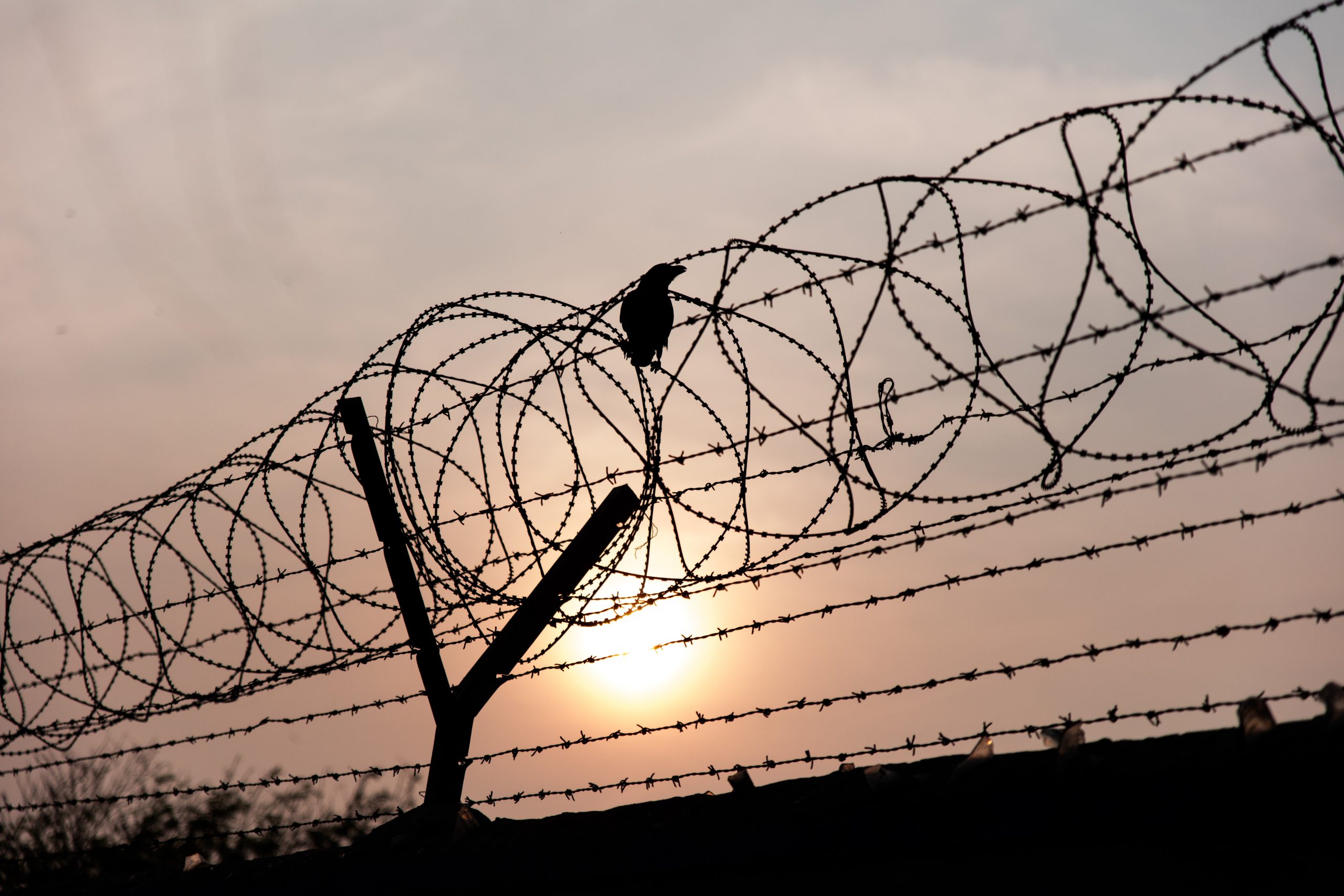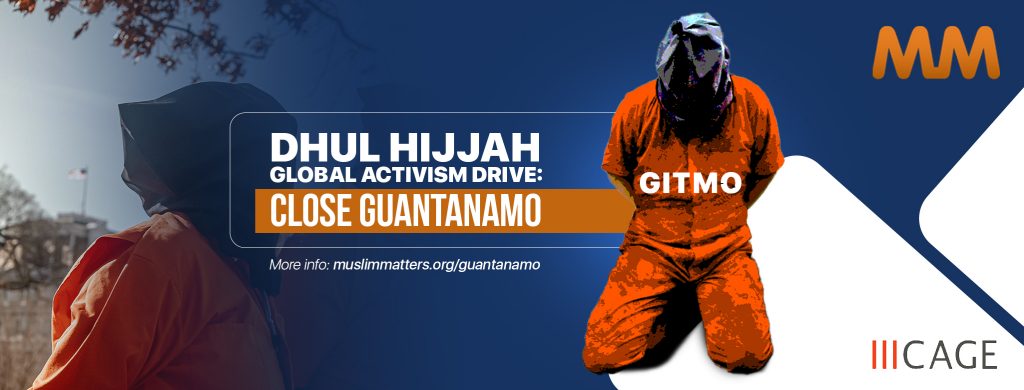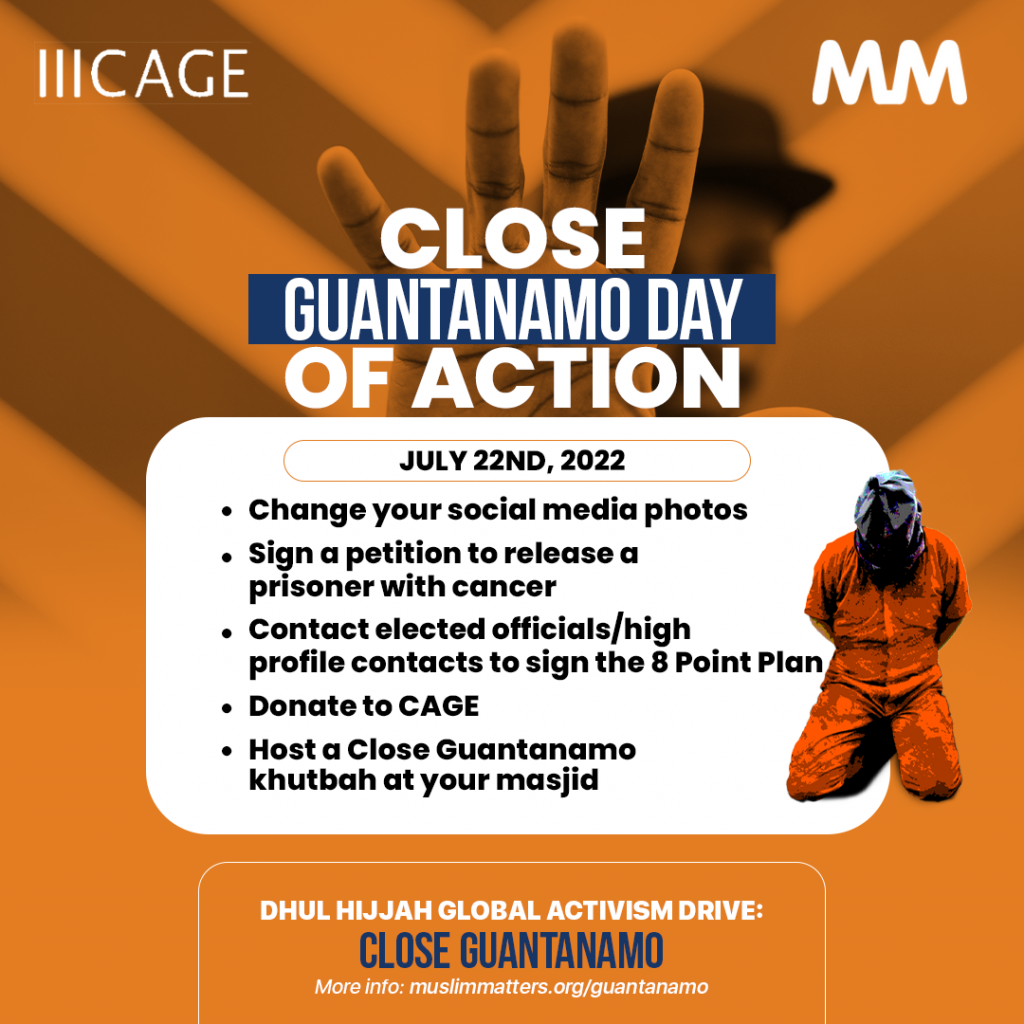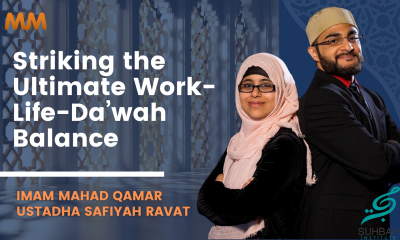#Current Affairs
Guantanamo Bay: Past And Present
Published

The words “Guantanamo Bay” hardly need much introduction. Opened amongst the hysteria and bloodthirst of a post-9/11 world, this detention camp stands as one of the most notorious prisons in modern times.
Images of (exclusively) Muslim men shackled, hooded, and made to kneel in scorching cages off the shore of Cuba have become one of the defining images of what the newly minted “War on Terror” had enabled in 2002. It still remains open today.
Guantanamo Bay is more than just a legal no-man’s land however; it signalled the beginning of a global movement to usurp international law, abuse human dignity, and deny basic rights to fair representation for men presented to the world as “the worst of the worst.”
Keep supporting MuslimMatters for the sake of Allah
Alhamdulillah, we're at over 850 supporters. Help us get to 900 supporters this month. All it takes is a small gift from a reader like you to keep us going, for just $2 / month.
The Prophet (SAW) has taught us the best of deeds are those that done consistently, even if they are small. Click here to support MuslimMatters with a monthly donation of $2 per month. Set it and collect blessings from Allah (swt) for the khayr you're supporting without thinking about it.
In the name of freedom, Guantanamo Bay is just one cog in a vast machine of CIA black sites across the world where prisoners are taken for weeks, months, and years to be brutally tortured. Some never make it out alive. Some disappear altogether. Some are then transferred to Guantanamo Bay to face indefinite detention without trial or charge.
The era of state-sanctioned torture in plain sight had arrived. The 2014 Senate report on CIA torture highlighted many of the gruesome torture methods, euphemistically referred to as ‘”enhanced interrogation techniques.” The lack of due process is a reality that stifles lawyers struggling to represent their clients, as they are heavily-redacted files that prisoners themselves are banned from seeing. Many are never given answers to the most basic questions: Why are we here? What are the charges against me? What evidence do you have? Will I ever get my day in court? Will I leave here alive?
Our organization began named “CagePrisoners” in reference to what these men had become to the world: dehumanized prisoners held in cages. With secrecy and a damning silence around the plight of Guantanamo’s detainees, CAGE was the first to produce a list of named prisoners – which was published in the Washington Post in 2005 – publicizing the names of, and sharing information about prisoners when the US government refused to. Today, Guantanamo is one of a broad and growing number of issues that we advocate for; our work united under the common banner of abuses meted out in the name of the “War on Terror.”
Despite two decades of campaigning, Guantanamo remains open, while still being viewed as a symbol of the injustice of the War on Terror. President Obama acknowledged it “is contrary to who we are, it is contrary to our interests, and it needs to stop.” President Biden is now pursuing a policy of closing the detention site. The shift in opinion on Guantanamo owes itself in no small way to the tireless efforts of campaigners in calling for justice and changing the narrative on Guantanamo.
We at CAGE remain committed to highlighting abuse of state power – work that is ever more critical in today’s world. In a world of competing and conflicting narratives, raising our voices to protect justice is our individual and collective responsibility. We celebrate the successes when they come, and have been heartened to see many former detainees leave the camp to become authors, speakers, activists, and thought leaders in their own right. The work is far from over however, and to do more, we must first know more. Here is a summary of what we all need to know:
Key Facts
- 779 people have been held at Guantanamo Bay in total
- Only 12 have been charged, 10 are awaiting trial, 2 are convicted
- Age range of prisoners: 13 to 87
- 9 have died, some ruled as suicides, which are widely believed to be cover-ups
- In 2006, 86% of the 517 prisoners had been handed to the US by Pakistan or Northern Alliance, during a time when the US offered substantial bounties for capture
- Today, 37 prisoners still remain
- Many prisoners have been held for over 10 years without trial
- When trials eventually happen, these occur in secretive US military ‘kangaroo’ courts without fair representation or due process
- The US constitution forbids the suspension of habeas corpus. Such suspension is foundational to Guantanamo.
- The US claims prisoners are exempt from US or international legal protections
- The US manipulates interpretations of the Geneva Convention to avoid obligations towards prisoners
- There have been numerous court judgements against practices in Guantanamo, including two high profile supreme court rulings: Rasul v. Bush (2004) and Boumediene v. Bush (2008). These gave prisoners the right to have their cases heard at the Supreme Court and access to the US legal system, ensuring they were covered under prisoner protection legislation.
How has this happened?
- The 9/11 attacks are used as the foundational warrant for illegal activity by the US, including at “black sites” in Afghanistan and Guantanamo Bay
- What this obfuscates is the US’s role in developments before 2001, including its presence in Afghanistan and role in funding military groups since the 1980s
- Guantanamo Bay is upheld by Islamophobic policies elsewhere, part of a broader counter-terrorism ideology. Through this, expression of Muslim identity, belief, and practice are marked as risk factors and “predisposal” to terrorism. This is escalated to accusations of terrorism based on dubious and baseless claims against the vast majority of Guantanamo prisoners. Evidence is not scrutinized justly as it is filtered through a lens of dangerous “Islamist” ideology. “Islamist” itself is a newly-coined term without legal definition, and positions extremism as a tendency of Muslims.
- Guantanamo Bay is filled exclusively by Muslim men. A global culture of demonizing Muslim belief and practice has opened the door to draconian policies to target the Muslim community. This is seen in action through things like Muslims making up the majority of stops under terror legislation at places like airports in the US, UK, and many other countries
Life Upon Release
- Prisoners have no choice in destination upon release. Decisions about their future are taken without consultation or transparency
- Surveillance cameras are installed in their government-assigned residences, and listening software on government-issued phones
- In being unable to obtain a passport from their home and host countries, and often denied the ID card that they were promised, former prisoners are left effectively stateless
- Many die or suffer with PTSD, homelessness, and lack of access to basic healthcare
- Many are imprisoned upon arrival in host country (particularly UAE), where they face more torture and solitary confinement
- There is no formal rehabilitation or reintegration programme, with job opportunities and basic citizen rights denied
- They continue to face the stigma of being a prisoner – on a community and state level – even when they were never convicted of a crime
Contemporary Developments
- There has been continued campaigning for the closure of Guantanamo Bay
- Higher numbers of prisoners have been released after being deemed as posing no threat or having past involvement in terrorism
- Uncertainty over the future remains. Shutting down the detention center does not guarantee long-overdue legal trials for prisoners. Detainees are highly unlikely to be transferred to the US
- An 8-point plan to close Guantanamo must be followed and advocated for. ( See below)
8-point plan from seven former prisoners first published in the New York Review of books:
- All those cleared for release are immediately repatriated to their home countries, as long as they are safe from arbitrary imprisonment and persecution
- The office for the special envoy is reopened and suitable countries are sought to restart the resettlement process for those unable to return to their homes
- Appropriate measures are taken to ensure that former prisoners are granted the means to start a meaningful life in the new country and are afforded protections from violations of those measures by the receiving state
- The concept of “forever prisoners” is rescinded, and those not facing charges under the military commissions are repatriated or resettled (as above) following appropriate security arrangements
- Repatriation/resettlement should not take place by force, and prisoners are not resettled where they will face arbitrary imprisonment once again
- Periodic Review Board reports should be superseded by the imperative to close Guantanamo and not obstruct the above measures
- The military commissions should be scrapped, and those facing charges should have their cases tried in accordance with the law
- Where appropriate and practical, mechanisms are put in place whereby those convicted of crimes can serve their sentences closer to home
A Call To Action
Guantanamo Bay is not an aberration. It is one of the most notable symbols of an ever-expanding counter-terror network steeped in Islamophobic assumptions and actions. As a community, we must take effective, informed, and practical action to raise awareness around the injustices and abuses that are taking place in real time. Our advocacy works on multiple levels: from learning to sharing information, from supporting the organizations who are dedicated to this work and to re-examining the narratives that distort our understanding of state abuse against the belief and practice of observant Muslims.
This is the time for all of us to organize and ally with one another to call for accountability, on behalf of those who are unable to advocate for themselves. Guantanamo Bay is more than just a symbol, it is our obligation towards the oppressed and to our own selves. It is a signpost pointing to the work ahead for all of us. We must unite together and stand firm to raise our voices for justice, together.
Related reading:
– Dhul Hijjah Global Activism Drive: Close Guantanamo
– I Saw Him Murdered Saying “Ya Allah!”
Keep supporting MuslimMatters for the sake of Allah
Alhamdulillah, we're at over 850 supporters. Help us get to 900 supporters this month. All it takes is a small gift from a reader like you to keep us going, for just $2 / month.
The Prophet (SAW) has taught us the best of deeds are those that done consistently, even if they are small. Click here to support MuslimMatters with a monthly donation of $2 per month. Set it and collect blessings from Allah (swt) for the khayr you're supporting without thinking about it.
CAGE advocates for due process, the rule of law and an end to the injustices of the War on Terror. CAGE is an independent grassroots organisation striving for a world free of injustice and oppression. We campaign against discriminatory state policies and advocate for due process and the rule of law. We work closely with survivors of abuse and mistreatment across the globe, documenting their abuse and enabling them to take action and access due process. We carry out cutting edge research and provide a voice for survivors of the war on terror, challenging the dominant narrative of suspect communities and the perceived threat of terrorism. We empower communities through educational workshops, community events and informative seminars.


“What Did You Just Say?”: A MuslimMatters Open Letter Series I Dear Avi Benlolo

[Podcast] How to Fight Islamophobia | Monia Mazigh

Little Bayramgul – A Short Story

Why Your Kids Should Not Be Huffadh

Cancer, Mum, & Me: A Story of Hardship and Ease

The Things He Would Say – [Part 2]

‘Afraa’ and Yawm al-Khulayf: A Cinderella Story

Why Your Kids Should Not Be Huffadh

Experiences, Lessons, And Reality Checks From Hajj 2024

Emotional Self-Healing: Lessons From The Quran And Sunnah

IOK Ramadan: The Importance of Spiritual Purification | Keys To The Divine Compass [Ep30]

IOK Ramadan: The Power of Prayer | Keys To The Divine Compass [Ep29]

IOK Ramadan: The Weight of the Qur’an | Keys To The Divine Compass [Ep28]

IOK Ramadan: Families of Faith | Keys To The Divine Compass [Ep27]











